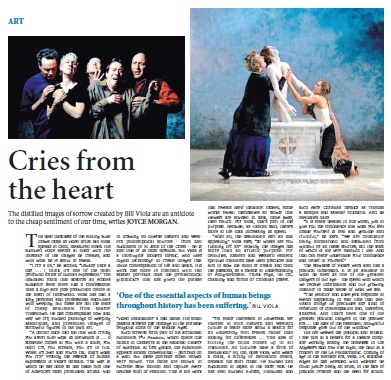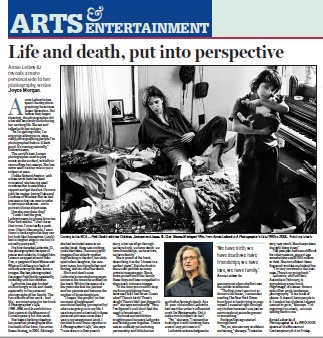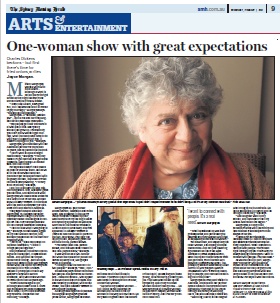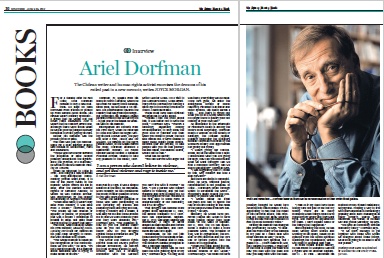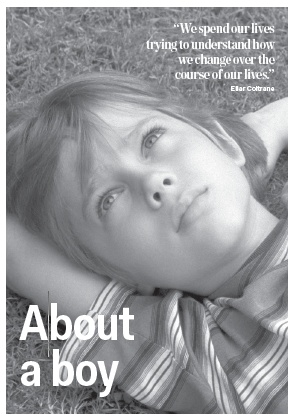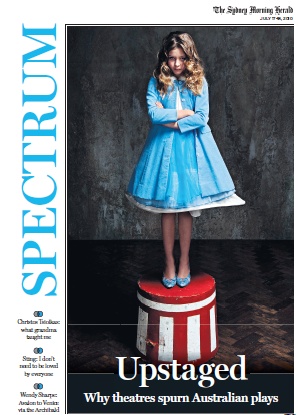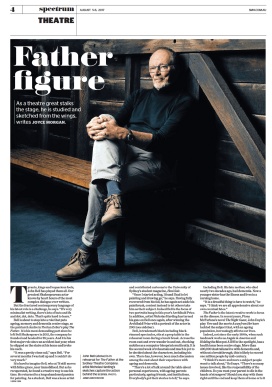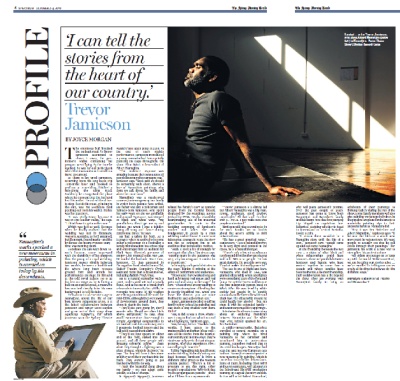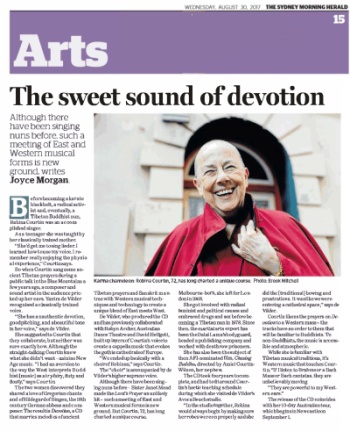Joyce Morgan has been a journalist for nearly four decades. See a selection of her favourite stories that profile cultural figures from Australia and beyond.
Cries from the heart
The Sydney Morning Herald
July 12, 2005
The distilled images of sorrow created by Bill Viola are an antidote to the cheap sentiment of our time, writes Joyce Morgan.
The near darkness of the editing suite draws close as video artist Bill Viola speaks in calm, measured tones. His subdued voice seems at odds with the
intensity of the images he creates, and with what he is about to reveal.
‘‘I cry a lot,’’ he admits. ‘‘Usually once a day . . . I think it’s one of the most profound forms of human expression.’’ The insulated room that absorbs all echoes suddenly feels more like a confessional than a high-tech post-production centre in the heart of Hollywood.
Viola has had a long personal and professional encounter with weeping. But these are not the tears of cheap sentiment from nearby Tinseltown. He has contemplated how and why we cry, studied paintings of weeping Madonnas, and presented images of sorrowful figures in his own art.
Life and death, put into perspective
The Sydney Morning Herald
November 17, 2010
Annie Leibovitz reveals a more personal side to her photography, writes Joyce Morgan.
Annie Leibovitz has spent the day photographing the actress Susan Sarandon. But before they began shooting, the photographer did what she has rarely done during her working life. She sat and talked with her subject.
“As I’mgetting older, I’m enjoying talking more, especially photographing people I’ve photographed before. It feels good. It’s coming naturally,’’ Leibovitz says.
The world’s best-known photographer used to play music as she worked, initially to camouflage her reserve. She has never seen it as her role to put a
subject at ease.
One-woman show with great expectations
The Sydney Morning Herald
February 1, 2012
Charles Dickens beckons — but first there’s time for fried onions, writes Joyce Morgan.
Miriam Margolyes wants a word with JuliaGillard – although a word is not all the forthright British actor might deliver if she encounters the Prime Minister.
‘‘I love JuliaGillard, she’s great fun, but I believe she is not in favour of gay marriage,’’ Margolyes says. ‘‘She should be smacked.’’
Margolyes – a ‘‘socialist, lesbian Jew’’ – is on a roll and her crisp English diction reaches a crescendo.
Interview: Ariel Dorfman
The Sydney Morning Herald
June 9, 2012
The Chilean writer and human rights activist exorcises the demons of his exiled past in a new memoir, writes Joyce Morgan.
For a decade after he fled Chile, Ariel Dorfman refused to buy a new mattress. He slept on beds borrowed from friends or picked up from second-hand stores.
His refusal wasn’t entirely symbolic – a signal that he would not put down roots elsewhere. And it wasn’t that he couldn’t afford one, although there were times when he was so poor he jumped subway turnstiles to avoid paying his fare.
Rather, his decision was the prosaic price of exile. The item was just too cumbersome for a man shifting around safe houses in Amsterdam, Paris
and elsewhere.
‘‘Those who have never suffered the iniquities of exile cannot possibly understand the significance, the gravitas, of a mattress,’’ he writes in his new memoir Feeding on Dreams.
About a boy
The Saturday Paper
May 10, 2014
Unique and ambitious, the latest film project from Richard Linklater follows the life of a child and his family over a 12-year period. Joyce Morgan meets the makers and star of Boyhood.
Soon after he dresses up as Harry Potter to attend a party, the young star of Richard Linklater’s film Boyhood has a question. “There’s no real magic in the world, is there?” he asks his father. No. “And no elves?” No.
It is a fleeting but pivotal exchange, the instance when childhood begins to crumble. The boy stands at the threshold of a complex but less enchanted world. Boyhood follows the boy and his fictional family over 12 years during which its focus, Mason (played by Ellar Coltrane), grows from a dreamy six-year-old with a Game Boy in hand to a rangy youth with his hands on a steering wheel.
Unique is an overused word, but there is little to compare with the way in which the director made his film. Instead of substituting Coltrane for an older actor to mark the passing of time, Linklater stuck with Coltrane and the same key cast members throughout.
Upstaged: Why theatres spurn Australian plays
The Sydney Morning Herald
July 17, 2010
Australian plays are too white, too middle class . . . and there are too few of them. Joyce Morgan looks at the debate raging over the health of our theatre.
A playwright sits alone, pen in hand, in a cavernous room. Another is deep in discussion with the creative team around a long table. A third unwinds with a couple of actors near a steaming tea urn.
All morning, playwrights from around Australia have been watching actors breathe life into their words. They have heard how the lines they have penned over months – and perhaps read aloud only to themselves – sound when delivered by those trained to do so.
By mid-afternoon, some of the six playwrights have already embarked
on rewriting, putting the red pen through some parts, perhaps even killing off a cherished character, or adding a new plot twist. They will return the next day to repeat the process in the chilly CarriageWorks performance space in Newtown.
Father figure
The Sydney Morning Herald
August 5, 2017
As a theatre great stalks the stage, he is studied and sketched from the wings, writes Joyce Morgan.
Tyrants, kings and loquacious fools, John Bell has played them all. Our greatest Shakespearean actor knows by heart hours of the most complex dialogue ever written.
But the fractured contemporary language of his latest role is a challenge, he says. “It’s very minimalist writing, there’s lots of buts and ifs and dot, dot, dots. That’s quite hard to learn.”
Bell in about to step into a role that puts ageing, memory and dementia centre stage, as the patriarch Andre is Florian Zeller’s play The Father. It is his most demanding part since he left Bell Shakespeare in 2015, the company he founded and headed for 25 years. And it is his first major role since an accident last year, when he slipped on the stairs at his home and broke his neck.
‘I can tell the stories from the heart of our country’
By Joyce Morgan
The Sydney Morning Herald
October 2, 2010
The enormous bull blocked the outback road. As Trevor Jamieson attempted to chase it away, the performer’s wallet containing his passport went flying. By the time he realised, he was far out in the bush where there was not much need for a travel document.
So there it lay until Jamieson, returning from his long bush trip 18 months later and booked to perform at a wedding, hitched a ride along the same road. Suddenly he recognised the place where he encountered the bull and
lost his wallet. He asked the driver to stop. Beside the road, glinting in the sun, was his Medicare card peeking out from his wallet. Inside was his passport.
‘‘It was nicely intact because it was in this leather wallet,’’ he says. ‘‘I didn’t have to get another one.’’
The sweet sound of devotion
The Sydney Morning Herald
August 30, 2017
Although there have been singing nuns before, such a meeting of East and Western musical forms is new ground, writes Joyce Morgan.
Before becoming a karate blackbelt, a radical activist and, eventually, a Buddhist nun, Robina Courtin was an accomplished singer.
As a teenager, she was taught by her classically trained mother.
“She’d get me to sing lieder. I learned how to use my voice. I remember really enjoying the physical experience,” Courtin says.
So when Courtin sang some ancient Tibetan prayers during a public talk in the Blue Mountains a few years ago, a composer and sound artist in the audience pricked up her ears.
